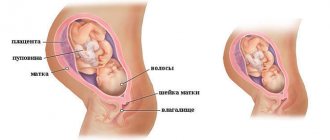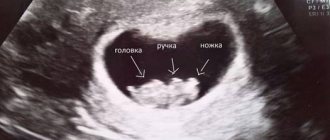How to determine whether pregnancy has occurred if the delay in the onset of the menstrual cycle is still far away, or it is small? In most cases, without monitoring basal temperature, using tests and a blood test for hCG (human chorionic gonadotropin), this is quite difficult or impossible. There are some indirect signs that pregnancy has already occurred, and whether they manifest themselves in a particular woman is an individual question. For some expectant mothers, the first signs of pregnancy appear within the first few days after conception, while others do not notice anything until obvious signs appear several weeks later. It depends on the woman’s sensitivity, temperament and individual characteristics of her body. Of course, since pregnancy involves major lifestyle changes, it is important to find out about it as early as possible. Therefore, below we will talk about possible signals and signs that conception has occurred and you need to be more attentive to your health, reconsider some habits and happily prepare for the birth of your baby. We will talk about symptoms that appear before a delay in the menstrual cycle or in the first days after it.
When and how does conception occur?
The egg is fertilized the moment it leaves the ovary and enters the abdominal cavity. This process is called ovulation. Ovulation occurs around the middle of the menstrual cycle. After conception, the fertilized egg begins to move towards the uterus. Its journey takes from seven to ten days, and pregnancy is considered to have occurred at the moment when the egg has already attached to the wall of the uterus.
Thus, the first week after ovulation is, in fact, preparatory, and the woman may not be aware of her condition. Hypersensitive individuals claim that at this time they felt a tingling in the ovary, pain in the lower back, noticed an increase in discharge and an unstable emotional state. All these symptoms are quite likely during ovulation and are not necessarily associated with pregnancy. Unusual sensations may also be associated with the onset of premenstrual syndrome.
Beli
There are often statements on various forums that white discharge is a sign of pregnancy. To some extent, this is true, because after the egg is released from the follicle and fertilized, the level of progesterone in the body increases, which increases the production of mucous secretion by the glands of the cervical canal. This happens due to the fact that the uterus is preparing for transplantation of the fertilized egg and is actively cleared of pathogenic microorganisms.
However, it is impossible to say for sure that white discharge before menstruation is a sign of pregnancy, since increased production of leucorrhoea can also occur for other reasons, for example:
- While taking medications (some, before conceiving a child, undergo a course of drug treatment to eliminate inflammatory and infectious processes in the reproductive organs and the risks of possible complications after conception).
- Abrupt climate change.
- Stress and worries.
- Use of lubricants.
- The use of intimate hygiene products with a high content of fragrances and dyes.
- Douching, etc.
Use of tests and tests for pregnancy
The most accurate ways to determine pregnancy before a missed period can be:
- Change in basal temperature
- Blood test for hCG
Basal or rectal temperature is the body temperature at rest after a night's sleep, measured in the mouth, rectum or vagina. The basal temperature chart is kept according to the indications of a gynecologist, in the event, for example, if there is a suspicion of infertility. Some women use this as a way to protect themselves from unwanted pregnancy, to determine the time of ovulation by the changed temperature and to exclude sexual intercourse on these days. Conclusions about pregnancy can be made if the graph shows a clear rise in temperature, you had sexual intercourse one or two days before or during ovulation, and your temperature remains high fourteen days after ovulation. Normally, basal temperature decreases towards the onset of menstruation.
Human chorionic gonadotropin (hCG) is a hormone that is produced in a woman’s body only during pregnancy. It is hCG that regulates the processes in the body of the expectant mother that are necessary for the normal bearing of a child. This hormone is excreted from the body by the kidneys, so it can be easily detected in urine, which is used when using pharmacy pregnancy tests. But the concentration of the hormone in the urine becomes sufficient to be determined a couple of weeks after fertilization, so tests are used only from the first days of a delayed menstrual cycle. Before the delay occurs, hCG can be detected in the blood as early as nine days after ovulation. Then its concentration doubles every two days.
So, a pharmacy pregnancy test is used after a delay in the cycle. If in the first days of the delay the test shows a negative result, but after a week menstruation has not occurred, it makes sense to repeat the test. Ovulation (and therefore conception) may have occurred later, and the hCG level may not have been sufficient to detect pregnancy.
How to understand that you are pregnant
Table of contents
Pain in the lower abdomen Sensitivity and soreness of the breasts, an increase in their size Darkening of the nipples Mood swings Delayed menstruation Nausea Drowsiness, fatigue Frequent urination Dizziness and weakness Temperature changes How to 100% determine that you are pregnant What needs to be done in the early stages
Photo source: shutterstock.com
Immediately after fertilization of the egg, a serious restructuring begins in the female body: the level of the pregnancy hormone, progesterone, increases, which is necessary for implantation of the fertilized egg, normal development of the embryo, and preparation of the mammary glands for milk production after childbirth. Along the way, it also affects the nervous system, intestinal tract, metabolism, insulin production, and blood pressure.
It is because of this that already in the first weeks of pregnancy signs such as:
| Duration (in weeks) | Signs |
| 1-4 | Nagging pain in the lower abdomen, lower back and spotting |
| 1-6 | Aggressiveness, irritability, tearfulness, mood swings |
| 4 | Delay of menstruation |
| 4-6 | Breast engorgement and tenderness, increased nipple sensitivity |
| 4-6 | Nausea, bloating, bowel dysfunction |
| 4-6 | Dizziness, drowsiness, slow reaction, fatigue, absent-mindedness |
| 5-6 | Frequent urination without pain |
| 6-8 | Decrease/increase in blood pressure, appetite, body temperature, libido |
Let's look at each of them in more detail.
Pain in the lower abdomen
A woman may notice an unpleasant pulling sensation in the lower abdomen, and sometimes in the lower back. They are explained by the fact that the fertilized egg finds its place in the uterus and attaches to the endometrium, which lines its inner walls. This process may be accompanied by slight bleeding, which can easily be confused with menstrual discharge. But in fact, completely different processes occur in a woman’s body at this moment.
Sensitivity and soreness of the breasts, increase in their size
The body of the expectant mother is being rebuilt and in the early stages of pregnancy often experiences significant hormonal overloads. This affects many systems, including the condition of the mammary glands. They swell and become more sensitive. Breast size gradually increases, and you may find that first you have to fasten your bra to a further hook, and then even buy new underwear, since all your existing bras have become too small.
Some women may experience unpleasant pain. They usually go away by the 6th week of pregnancy, when the hormone surges stop.
Darkening of the nipples
In addition to the fact that a woman’s breasts enlarge and become more sensitive, the veins on their surface become more noticeable, and the nipples change structure and color. They look rough and dark, and in some cases there is slight pain when touched.
Mood swings
A pregnant woman often feels like a volcano of emotions. Her mood can change from joyful euphoria to causeless anxiety and sadness. Many expectant mothers become much more sentimental already in the first trimester, they can cry over a trifle or start a scandal out of the blue.
In such a situation, hormones are again to blame. The level of progesterone and estrogen in the early stages of pregnancy is so elevated that even the most reserved ladies notice excessive sensitivity.
Delay of menstruation
At the moment when the fertilized egg takes its place in the uterus, the woman’s body begins to intensively produce the hormone hCG (human chorionic gonadotropin). Its elevated level signals that “mission accomplished” and the ovaries should temporarily stop releasing eggs.
If a woman’s cycle is regular, a delay of even 1 day can be a signal that a new life is being born inside her. Although, according to medical standards, menstruation is considered delayed if it is late by at least 5 days.
In cases where a woman's cycle is not as regular, this sign of pregnancy may not be so obvious.
Nausea
Due to a sharp increase in the level of the hCG hormone, many women experience nausea in the first trimester of pregnancy. Most often it occurs in the morning, but can continue throughout the day. This is a rather debilitating symptom that leads to weakness and excessive fatigue. To alleviate its consequences, doctors advise drinking more fluids.
The good news is that nausea will not accompany you for the entire 9 months. Its most intense period occurs in the first weeks of pregnancy. Over time, the urge becomes less and less, and by the second trimester the nausea usually goes away completely.
Drowsiness, fatigue
Constant changes in the body of the expectant mother, debilitating toxicosis, and hormonal fluctuations lead to the fact that many women feel tired in the morning.
During this period, it is important to be especially caring towards yourself:
- sleep a sufficient amount of time, interrupting for daytime naps, if possible;
- do not overload yourself with work and excessively intense physical activity;
- monitor a balanced diet and drinking regime;
- consume enough vitamins and minerals;
- do not experience severe stress.
Frequent urination
Beginning preparations for bearing a child, the uterus increases in size already in the early stages of pregnancy. As a result, pressure on the bladder increases. In addition, blood circulation in a woman’s body increases, which means that the kidneys begin to work harder. All this leads to more frequent trips to the toilet.
Photo source: shutterstock.com
Dizziness and weakness
They arise due to the fact that many expectant mothers have low blood pressure. This becomes especially noticeable if a woman makes sudden movements: at this moment she may feel a headache and clouding of consciousness. She may feel weak and should not hesitate to take a few minutes to regain her well-being.
Dizziness due to low blood pressure in early pregnancy is considered completely normal. The opposite situation, when the pressure suddenly rises, should cause concern.
Temperature changes
In early pregnancy, a woman's body temperature may be slightly elevated. This is considered normal and should not cause panic. However, it is better to discuss temperature fluctuations at an appointment with a doctor so that he can help rule out other reasons for its changes.
Many of the above signs of pregnancy accompany PMS, and some signal health problems. Bloating and diarrhea can be caused by dinner at a bad restaurant or problems with the gastrointestinal tract in general. Frequent trips to the toilet are one of the signs of diabetes, and atypical vaginal discharge is most often associated with gynecological diseases.
To avoid misdiagnosing yourself, we advise you to use proven methods for determining pregnancy.
How to determine 100% that you are pregnant
The easiest way to determine pregnancy are tests that are sold in every pharmacy. It is important to remember that they differ in sensitivity: inkjet and tablet strips can be used a week before the start of your expected period; regular test strips can determine the result only from the first day of the delay.
When purchasing, pay attention to the test labeling: it shows its sensitivity in Mme/ml. The lower this value (minimum 10 Mme/ml), the earlier he will be able to diagnose pregnancy.
If you do not fully trust pharmacy tests, you can get tested for the level of the hCG hormone in the hospital. And then go with the result to a gynecologist, who will help interpret the result.
To be sure you are pregnant, you can undergo an ultrasound. But this can be done no earlier than the 4th week from the moment of conception.
What needs to be done in the early stages
After pregnancy is confirmed, it is important for a woman to reconsider her lifestyle so as not to harm herself and the unborn child.
It is worth temporarily excluding:
- alcohol;
- smoking;
- extreme sports;
- long work at a computer or mobile phone;
- going to the bathhouse and saunas, taking too hot baths;
- hair coloring with aggressive agents;
- compressive underwear and overly tight clothing;
- wearing high heels for a long time;
- visiting large crowds of people.
If there is no direct prohibition from the doctor, in the early stages of pregnancy you can:
- do yoga, swimming, fitness;
- arrange walks in the fresh air;
- have sex;
- fly on airplanes;
- drink coffee and tea, but in small quantities.
During this period, it is important to avoid excessive stress and overload. A woman’s body is already going through enormous changes, all organs and systems operate in a new mode, so it is worth taking care and not exposing yourself and the unborn child to unnecessary danger.
You should consult with a specialist about any medications you plan to use. Even if you took some pills as prescribed by your doctor before pregnancy, they can become dangerous for the fetus. Self-medication is strictly prohibited.
If you do not have food allergies and direct prohibitions from your doctor, you can eat anything you like. It is only important to remember the principle of moderation and variety, avoid overeating and ensure that the body gets enough vitamins and minerals.
Physiological changes in the first weeks of pregnancy
The first weeks after conception, of course, bring global changes to the functioning of a woman’s body. Most of them are difficult to associate with real sensations. But there are some signs that may indicate that conception has occurred:
- Vaginal discharge that is not typical for the normal state (white, or, on the contrary, bloody). They are called implantation.
- Exacerbation of chronic diseases (cervical erosion, hemorrhoids)
- Swelling of the mammary glands, discomfort in the chest
- Tingling in the ovary area, lower back pain
Remember that all these phenomena are secondary signs and do not necessarily indicate pregnancy.
Subjective sensations in the first weeks of pregnancy
Women who are hypersensitive may experience the following sensations:
- Cold-like illness
- Drowsiness or, on the contrary, problems sleeping
- Sudden mood swings
- Nausea
- Dislike of certain odors and foods
Other possible signs of pregnancy
Since every woman's body has unique characteristics, some expectant mothers may notice other signs in the first weeks of pregnancy. This is due to changes in hormonal levels, as well as active blood flow to the pelvic organs:
- Headache
- Increased appetite
- Gastrointestinal problems (constipation, diarrhea, flatulence)
- Acne on the face
- Allergies that never existed before
- Change in sexual desire
So, there are a number of signs that indirectly confirm pregnancy at a very early stage, before a missed period or in the first days after. But do not forget that the only reliable ways to determine pregnancy are a blood test for hCG and a test, a little later - the result of an ultrasound (ultrasound) and an examination by a gynecologist. Therefore, you should wait until the next cycle is absent, wait about a week, use a pharmacy test for hCG and, if the results are positive, prepare to experience this important and magical period in your life - pregnancy.
Yellow
Some women perceive yellow discharge as a sign of pregnancy. However, the appearance of yellow mucous vaginal secretion also does not always indicate successful conception. A yellowish secretion on panties can appear as a result of oxidative processes (vaginal mucus, when in contact with oxygen, oxidizes and becomes yellow) or insufficient hygiene.
Moreover, they can also occur when inflammation develops in the uterine cavity or cervical canal. Therefore, you should not think that their appearance occurs only during pregnancy before the delay.
It should be understood that false signs may also occur, which are characterized by nausea and weakness. Their appearance is caused by various reasons, for example, hormonal fluctuations in the body or frequent stress. They usually occur in the middle of the cycle, when increased production of progesterone occurs. However, if during this period a woman had sexual intercourse, then before the delay, the discharge as egg white is already a sign of pregnancy. Moreover, they can be either white or yellow.
Important! It is difficult to say exactly what kind of discharge occurs during pregnancy at the very beginning of its development. It all depends on the individual characteristics of the body and the factors affecting it.








